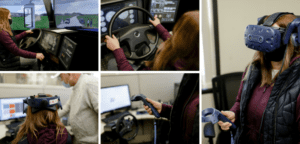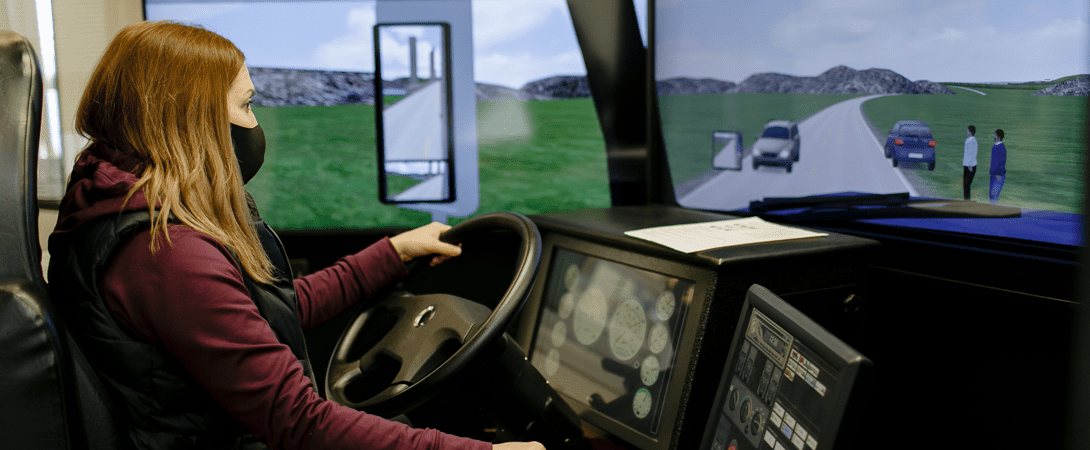
Commercial Heavy Equipment Training Ltd. (CHET), has been selected as a training partner for the government funded Natural Sciences and Engineering Research Council of Canada (NSERC) research project on City Logistics for the Urban Economy (CLUE).
The purpose of CLUE is to fill gaps in the Canadian Urban Freight System—a system that has fallen more under the public eye over the past two years thanks to the global pandemic. More of the general public are now aware of the challenges and systems that make up the freight system and the goal of research projects like this are to uncover more data and improve analytical tools to help understand effects on freight flows, supply chains, and infrastructure needs. CLUE is a research program of the Smart Freight Centre, a multi-university, multi-sector partnership working strategically to address the identified knowledge gaps.
 The initial presentation to CHET about the project was provided by PHD Candidate, Alia Galal from UTTRI. Alia herself is an up-and-comer in the industry. Alia received her BSc. degree in Industrial Engineering from the Arab Academy for Science and Technology in Alexandria, Egypt in 2017. She is currently a third year PhD candidate in the Civil Engineering department at the University of Toronto, supervised by Prof. Matthew Roorda and Prof. Birsen Donmez. Her PhD research combines freight transportation, human factors and traffic safety as she analyzes truck drivers’ skills and behaviour using a truck simulator. The aim of her research is to develop a truck driver training module specifically addressing latent hazard anticipation skills with the goal of improving traffic and vulnerable road user safety in Canada and worldwide.
The initial presentation to CHET about the project was provided by PHD Candidate, Alia Galal from UTTRI. Alia herself is an up-and-comer in the industry. Alia received her BSc. degree in Industrial Engineering from the Arab Academy for Science and Technology in Alexandria, Egypt in 2017. She is currently a third year PhD candidate in the Civil Engineering department at the University of Toronto, supervised by Prof. Matthew Roorda and Prof. Birsen Donmez. Her PhD research combines freight transportation, human factors and traffic safety as she analyzes truck drivers’ skills and behaviour using a truck simulator. The aim of her research is to develop a truck driver training module specifically addressing latent hazard anticipation skills with the goal of improving traffic and vulnerable road user safety in Canada and worldwide.
This is a very protracted research program that CHET will actively be involved in over the next few years. During that time, the training school will be counted on to provide simulator training, testing new technology in the area of sim training, and being a partner in the process of testing new training systems that are contributed to the project from research partners suggesting an alternative methodology.
“I have been to the MDTRC in Burlington a couple of times already, and am keenly interested in what they are working on that we can benefit from,” said CHET Operations Manager, Philip Fletcher. “They are working on facial recognition software to determine the student’s ability to take up information by facial movements like acceptance, enjoyment, frustration, disengagement, etc. Very exciting developments from a teaching perspective. Obviously, any enhancements to the training curriculum and technology will be used to perfect and refine the Driving Fleet of Musket Transport, and deliver better programs for reconstructive and onboarding instruction.”
The initiative includes 24 separate research projects that relate to different areas of the trucking industry and the associated data and metrics.

Photos of CHET’s Simulator and VR training systems in practice.
“It is really an honor for CHET to participate in a project funded by the federal government where we are the only training academy selected,” stated Fletcher.
Topics range from driver training to automated delivery of goods. The project CHET is most involved in is the “Safer Interactions Between Trucks and Vulnerable Road Users” project in partnership with the Smart Freight Centre.
“Goods movement hasn’t been studied as extensively as people movement but interest is growing as it becomes clear just how much we rely on an efficient goods movement system,” says Dr. Judy Farvolden, Executive Director of the University of Toronto Transportation Research Institute (UTTRI). “CLUE addresses issues of significance to Canadians and this collaboration of public and industry partners further strengthens our chances of success.”
Over $3 million in NSERC funding has been matched by contributions from other supporting institutions and partners, including CHET’s parent company, Musket Transport Ltd, for a grand total of over $11 million in direct and in-kind support.
“The project will help create some strategic relationships for CHET with companies like Walmart as well as Loblaw and McMaster’s Digital Transformation Center for new tech in training,” said Fletcher. “But most of all it’ll be an honour to contribute to the growth and development of freight systems and processes throughout Canada where the industry can benefit as a whole.”
In Truck News: CHET selected as urban freight research program training partner.

